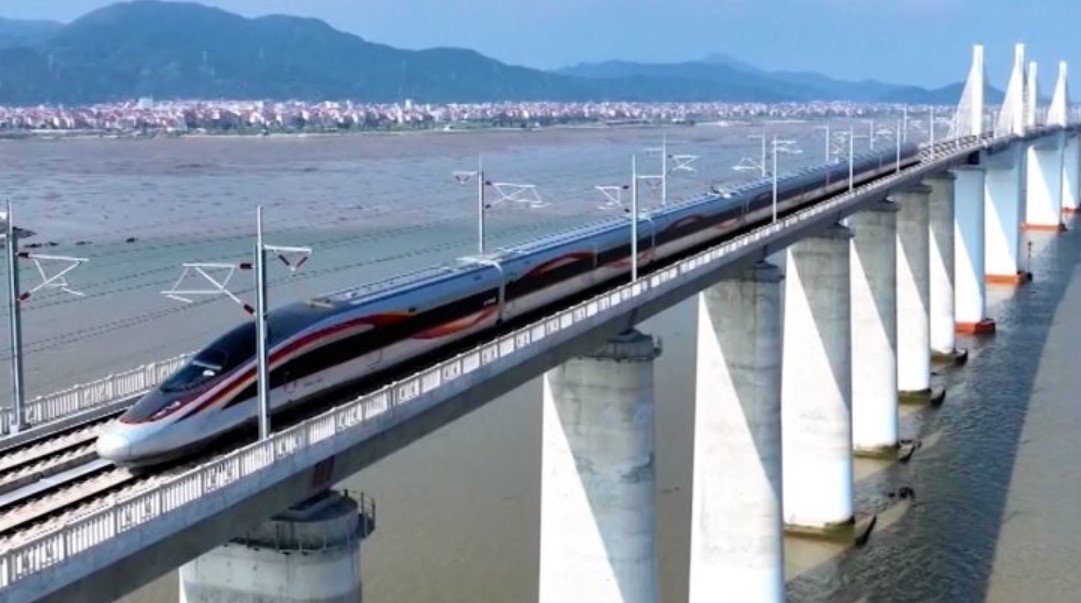China has unveiled its first overwater high-speed train line, connecting three coastal cities in Fujian province. The new railway, which runs along the west side of the Taiwan Strait, is seen as a strategic move to boost economic and cultural ties with Taiwan.
The 277-kilometer (172-mile) high-speed train line links the cities of Zhangzhou, Xiamen and Fuzhou, all of which are in Fujian province. The maximum speed of the trains along this route is 350 kilometers (218 miles) per hour, according to China Railway, the state railway operator.
The first train on this line debuted on Thursday, September 28, 2023, departing from Fuzhou, the province’s capital, at 9:15 a.m. The new railway currently has 84 bridges and 29 tunnels, plus 20 km (12 miles) of track that goes over the sea, making it the country’s first over-water bullet train.

China Railway says that it used intelligent robots and environmentally friendly corrosion-resistant steel to build out the overwater rail sections. The new line is expected to reduce travel time between the three cities by more than half, from about four hours to less than two hours.
The new line is just one of many infrastructure projects touted by the Chinese government in 2016, when the “Eight Horizontal and Eight Vertical” rail initiative was announced. The plan aims to create a comprehensive network of high-speed railways across China, covering more than 80% of major cities by 2035.
A strategic move to enhance cross-strait relations
Fujian province is also significant for being the closest part of mainland China to the self-governing island of Taiwan. Xiamen is just two and a half miles (10 km) across the Taiwan Strait from Kinmen, the easternmost region of Taiwan. China’s ruling Communist Party claims Taiwan as its own territory, despite having never controlled it.
According to Xinhua, the Communist Party released a circular earlier this month calling for “facilitating better connectivity and integration between Fujian and Taiwan.” The circular also urged promoting cross-strait exchanges in various fields such as culture, education, tourism and health.
The new overwater high-speed train line is seen as a part of this effort to enhance cross-strait relations. The railway will not only improve transportation and trade between Fujian and Taiwan, but also increase people-to-people contacts and mutual understanding.
However, not everyone is enthusiastic about China’s rail expansion. Some critics have raised concerns about the environmental impact of the overwater railway, especially on the marine ecosystem and biodiversity. Others have questioned China’s political motives behind the project, fearing that it could be used as a tool to exert pressure or influence on Taiwan.
A controversial proposal to build a bridge across the strait
The idea of building a physical connection between mainland China and Taiwan is not new. In fact, a controversial proposal from a group of eight local government councilors in Kinmen earlier this year suggested building a literal and metaphorical bridge across the strait.
The plan would turn Kinmen into a “peace island,” or a sort of DMZ between Taiwan and China. The proposed bridge would span about 10 km (6 miles) from Xiamen to Kinmen, with a checkpoint on each end. The bridge would allow people from both sides to visit each other without visas or passports, as long as they return within 24 hours.
The proponents of the bridge claim that it would boost tourism, trade and cultural exchange between Kinmen and Xiamen, as well as promote peace and stability in the region. They also argue that it would be beneficial for Kinmen’s economy, which relies heavily on mainland China for water and electricity supplies.
However, the proposal has met with strong opposition from many people in Taiwan, especially from the ruling Democratic Progressive Party (DPP), which advocates for Taiwan’s independence from China. They fear that the bridge would undermine Taiwan’s sovereignty and security, and expose Kinmen to military threats from China.
The DPP has also accused China of trying to interfere in Taiwan’s internal affairs by supporting the bridge project. The DPP has vowed to block any attempts to build such a bridge without its approval.
